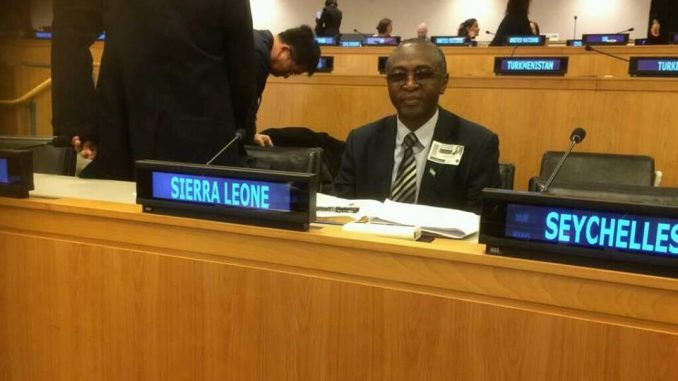
The Director of Diaspora Engagement of the Republic of Sierra Leone, Dr. Kallay Musa Conteh on Tuesday March 27 attended the first workshop of the UN Migration’s International Dialogue on Migration( IDM ), where he delivered an impressive and comprehensive paper on The Whole-Of-Society partnerships For Good Migration Governance.
The workshop was attended by representatives of civil society, migrants’ groups, experts and other stakeholders. It provided an informal and non-binding setting in which all stakeholders had an equal right to participate, fostering trust, openness and genuine exchange while addressing the full range of migration issues and their linkages with other policy domains.
In his deliverance at the workshop , Dr. Kallay Musa Conteh stated that Migration has, historically, been an integral part of livelihoods in Sierra Leone. He said that while migration from the country dates back to the 1960s, the recent civil war and endemic poverty have contributed to massive out-migration in the 1990s and that the number of Sierra Leoneans in the Diaspora is estimated to be 336, 000 (World Bank, 2016). Of this number, about 33.7% of Sierra Leoneans living in OECD countries are tertiary-educated (World Bank, 2016).
Discussing the three principles of good migration governance, Dr. Kallay Musa said that Good migration governance would require adherence to international standards and the fulfilment of migrants’ rights; Migration and related policies are best formulated using evidence and whole of government approaches ; Good migration governance relies on strong partnerships.
Dr. Kallay Musa Conteh also discussed the objectives of good migration governance. Good migration governance and related policy , he posited, should seek to advance the socioeconomic well-being of migrants and society. Secondly, Good migration governance is based on effective responses to the mobility dimensions of crises. He also stated that Migration should take place in a safe, orderly and dignified manner.
Delving deeper into the first principle of good migration governance, Dr. Kallay Musa Conteh propounded the fact that “Humane and orderly migration requires compliance with international law. The obligation to respect, protect and fulfil the rights of individuals is paramount and applies to all individuals within a State’s territory, regardless of nationality or migration status and without discrimination, in order to preserve their safety, physical integrity, well-being and dignity. ” He went on to elucidate that “Protecting the rights of individuals includes combating xenophobia, racism and discrimination, ensuring adherence with the principles of equality and non-discrimination, and ensuring access to protection.”
On the second principle that Migration and related policies are best formulated using evidence and whole-of-government approaches, Dr . Kallay Musa Conteh pointed out that “Migration policy is often the subject of intense political debate and can be based on populist sentiments.”
“Migration policy”, he went on, “must be based on facts and a well-founded analysis of the benefits and risks the movement of people poses to the State. To govern migration well, a State would collect, analyse and use credible data and information on, among other things, demographics, cross-border movements, internal displacement, diasporas, labour markets, seasonal trends, education and health. Furthermore, a State would seek to understand migration trends and reflect them in policies, including links with environmental degradation, climate change and crises.”
Dilating on the third principle that Good migration governance relies on strong partnerships , Dr .Kallay Musa Conteh stated that “By their very nature, migration and mobility implicate multiple actors: States and their neighbors, subnational authorities, local communities, migrants and their families, diasporas, employers and unions.”
“In addition,” Dr. Kallay Musa Conteh went on, ” there are dozens of intergovernmental and non-governmental organizations whose mandates touch on migration and humanitarian action. Governing migration well requires partnerships to broaden the understanding of migration, and to develop comprehensive and effective approaches. This means maintaining close partnerships with:Subnational governments, local authorities, cities and municipalities; Non-governmental actors at the domestic level, including employers, unions, diasporas, migrant associations, civil society, local community groups, religious organizations and academia, ensuring that the entities consulted are representative of all those in the population concerned; this could include, among others,public–private partnerships “.
WE WILL BRING YOU PART 2 OF THIS ARTICLE ON MONDAY



